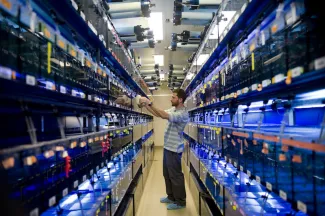About us

Boston Children’s Hospital invests heavily in research because science saves lives. We are focused on accelerating new treatments for devastating diseases — our discoveries translate from the laboratory bench to the patient’s bedside, where they have been improving the health of children and adults since 1869.
Today, our research enterprise is the world's largest and most highly funded at a pediatric hospital, with $423 million in research funding in FY2020 alone. In FY2022, Boston Children’s was #1 in National Institutes of Health funding for all U.S. children’s hospitals, and #4 in funding among all independent hospitals. More than 3,300 basic, clinical, and translational research employees work in our dedicated facilities, which total some 1 million square feet of space.
Members of our research community include 11 members of the National Academy of Sciences, 25 members of the National Academy of Medicine, 10 Howard Hughes Medical Institute Investigators, and nine Lasker Award recipients. In total, our research community publishes more peer-reviewed research in top scientific journals than the next 20 children’s hospitals combined — more than 3,000 annually since 2015.
Research discovery platforms
- genetics and genomics
- bioinformatics and big data
- large, diverse rare disease populations
- biobank of tissues from patients with diverse disorders
- multiple animal models
- engineered tissues, including organs on chips
- patient-derived, disease-specific cell lines and organoids
- single-cell sequencing and cellular “barcoding”
- automated, high-throughput image analysis
- proteomics, metabolomics, methylomics, and other “omics”
- gene editing with CRISPR/Cas9 technology
- biomaterials and bioengineering
- zebrafish drug discovery platforms
- 3-D human tissue construct for vaccine testing
Research discovery highlights
Recently, our scientists have:
- created the first personalized treatment tailored to a child’s unique genetic mutation
- mapped genes pediatric cancers depend on to live, opening a new universe of targets
- repurposed an arthritis drug for the prevention of graft-vs.-host disease in patients undergoing bone marrow transplant
- identified urine biomarkers to monitor brain tumors, moyamoya disease, and concussion
- restored hearing in deaf mice with gene therapy
- showed how immune cells help shape brain connections during development, opening new angles on schizophrenia and Alzheimer’s disease
- created blood stem cells in the lab
- developed new drug delivery methods, like nanoparticles activated by light or ultrasound, drug-eluting contact lenses, and bioengineered blood vessels
- used fetal cells from amniotic fluid to repair congenital defects in animal models
Precision medicine initiatives
“Precision medicine” at Boston Children’s begins with discoveries at the lab bench and ends with customized care based a patient’s genetic profile and disease biology. That can mean an epilepsy drug targeted to a child’s specific mutation, a vaccine designed specifically for the newborn immune system or genetic sequencing to match cancer patients with the right therapies. A few of our initiatives:
- Leading the “N of 1 Collaborative,” an international effort to formulate best practices around individualized treatments.
- The Manton Center for Rare Disease Research and the Children's Rare Disease Cohorts initiative to help solve patients’ genetic mysteries and begin to develop treatments. We are also a member of the NIH’s Undiagnosed Diseases Network.
- Gene therapy for sickle cell disease, severe immunodeficiency (SCID-X), adrenoleukodystrophy, relapsed acute lymphoblastic leukemia, Wiskott-Aldrich syndrome, and a growing list of other conditions. Our scientists have been instrumental in developing safer delivery vectors.
- BabySeq: Together with Brigham & Women’s Hospital, we are studying the impact of sequencing newborns’ DNA.
- CLARITY Challenges: We sponsored two international crowdsourcing challenges to analyze and interpret genomic information to benefit patients.
- Pharmacogenomics, reducing adverse drug reactions and improving children’s responses to therapy through genetic profiling
- The Precision Link Biobank for Health Discovery, a library of blood, tissue, and cells donated by thousands of patients and their families at Boston Children's Hospital to advance knowledge of health and disease.
- Exome sequencing initiatives for epilepsy, inflammatory bowel disease, and more.
